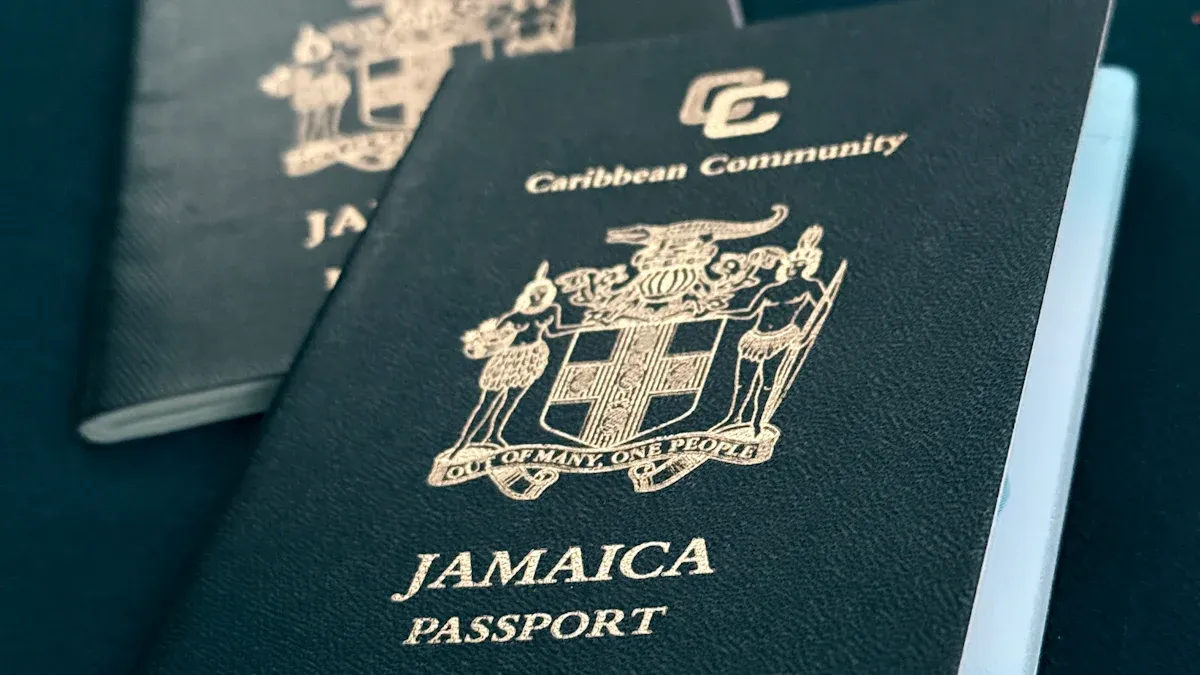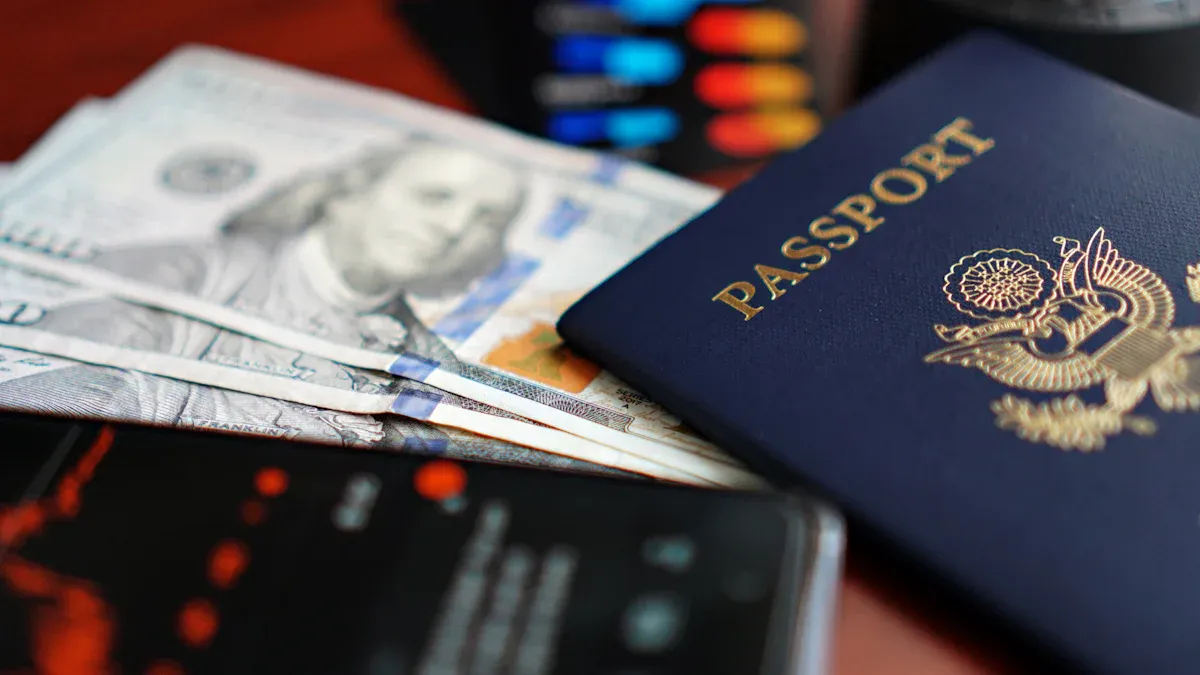- EasyCard
- Trade
- Help
- Announcement
- Academy
- SWIFT Code
- Iban Number
- Referral
- Customer Service
- Blog
- Creator
What Currency Does Jamaica Use? Analysis of Payment Methods, Remittances, and Exchange Rates

Image Source: pexels
When planning a trip to Jamaica, the first thing you need to understand is the situation regarding Jamaican currency. The official currency of Jamaica is the Jamaican Dollar (JMD). However, the U.S. dollar (USD) also plays a crucial role and is widely accepted in tourist areas.
The widespread use of the USD is directly tied to Jamaica’s thriving tourism industry. Tourism brings significant foreign exchange revenue to the country.
- Jamaica expects an annual visitor total of 4.5 million, generating approximately $4.6 billion in revenue.
- The Minister of Tourism announced that revenue from tourist spending is expected to exceed $5 billion.
As a result, you’ll encounter both currencies in many spending scenarios in Jamaica.
Key Points
- Jamaica has two primary currencies: the official Jamaican Dollar (JMD) and the widely used U.S. Dollar (USD).
- Tourists traveling to Jamaica should prepare both JMD and USD.
- In Jamaica, cash is the most common payment method, but bank cards are convenient in major cities and tourist areas.
- You can send money to Jamaica through banks, professional remittance companies, or online platforms.
- The exchange rate for the Jamaican Dollar is floating, influenced by tourism revenue and overseas remittances.
Jamaican Currency: Official JMD and Widely Used USD

Image Source: pexels
Understanding Jamaica’s two main circulating currencies can help you better plan your budget and daily expenses. Jamaica’s currency system comprises its official currency and the widely accepted U.S. dollar.
Official Currency: Jamaican Dollar (JMD)
The Jamaican Dollar (JMD) is Jamaica’s legal tender, with the symbol “” or “J”. You’ll encounter it in most daily transactions.
Currently circulating JMD banknotes and coins include:
- Banknote Denominations: 50, 100, 500, 1000, 2000 (new edition), 5000 JMD
- Coin Denominations: 1, 5, 10, 20 JMD
Practical Tip: Jamaica has recently issued new polymer (plastic) banknotes. You can verify their authenticity by checking unique watermarks, security threads, and the distinct texture of the polymer material to ensure secure transactions.
Widely Used Currency: U.S. Dollar (USD)
Due to the thriving tourism industry, the U.S. dollar (USD) serves as a secondary currency in Jamaica, particularly in tourist areas. In tourist hotspots like Montego Bay, Negril, and Ocho Rios, the USD is highly accepted.
Almost all hotels, large restaurants, chain stores, and tourist attractions accept USD payments. Often, prices in these places are directly quoted in USD.
JMD vs. USD Usage Scenarios
So, when should you use which Jamaican currency? A simple rule is: Use USD for tourist expenses and JMD for local experiences.
- Scenarios for Using USD:
- Paying for hotel accommodations
- Booking organized tours or activities
- Dining at large international chain restaurants
- Scenarios for Using JMD:
- Shopping at local markets or with street vendors
- Using public transportation
- Shopping at small stores in rural areas
Jamaica’s Main Payment Methods
Understanding viable payment methods in Jamaica can make your trip smoother. From street food to luxury resorts, different scenarios require flexible payment tools.
Cash: The Most Common Choice
In Jamaica, cash remains the dominant transaction method. A 2022 report indicates that locals heavily favor cash, with over two-thirds of adults receiving wages in cash. Therefore, keeping some cash on hand is always wise, no matter where you are.
At local markets, street vendors, or public transportation, cash is often the only option. You can use either JMD or USD, but using the local Jamaican currency typically secures fairer prices.
Safety Tips: While cash is convenient, you need to prioritize safety. Jamaican authorities recommend:
- Avoid carrying large amounts of cash.
- Be discreet when discussing financial matters in public.
- Regularly check your bank statements for suspicious transactions.
Bank Cards: Credit and Debit Cards
In Jamaica’s tourist areas and major cities, bank cards are a great complement to cash. Visa and Mastercard have the highest acceptance.
You can easily use bank cards at:
- Large Hotel Chains: Such as Sandals Resorts and RIU Hotels & Resorts.
- Chain Supermarkets: Such as MegaMart and Progressive Foods.
- Well-Known Pharmacies and Department Stores: Such as Fontana Pharmacy and Ammar’s.
However, in small towns, rural areas, or local shops, bank cards may not be accepted. Additionally, when using non-local cards, be aware of potential foreign transaction fees.
Mobile Payments: Emerging Methods
Mobile payments are a rapidly growing area in Jamaica, but they may not be a mainstream option for tourists. Local digital wallets are gaining traction, with Lynk being the fastest-growing platform, alongside other popular apps like ePay and Sagicor MyCash.
These apps primarily serve local residents and typically require a local bank account or phone number. As a tourist, you’re unlikely to use them. For your Jamaican trip, relying on a combination of cash and bank cards is a more practical and reliable payment strategy.
Cross-Border Remittances to Jamaica

Image Source: pexels
If you need to send money to family, friends, or businesses in Jamaica, understanding the characteristics of different channels is crucial. Choosing the right remittance method helps balance speed, cost, and convenience.
Traditional Bank Wire Transfers
International wire transfers through banks are the most traditional and secure method. You can initiate a transfer from your bank (e.g., a licensed bank in Hong Kong). The advantage is high security, with funds going directly to the recipient’s bank account. The downside is longer processing times, typically several business days, and relatively high fees.
Required Information for Transfers To ensure a successful transfer, banks typically require detailed information. For example, to send money to JMMB Bank in Jamaica, you need:
- Recipient Information: Name, account number, and address.
- Recipient Bank Information: Bank name, branch, and SWIFT/BIC code (JMJAJMKN).
- Intermediary Bank Information: Depending on the transfer currency, you may need the intermediary bank’s name and SWIFT code.
Professional Remittance Companies
Companies like Western Union or MoneyGram are known for their speed and convenience. Their biggest advantage is a vast network of agents. For example, Western Union has over 130 agent locations in Jamaica, making it easy for recipients to pick up cash quickly, especially for those without bank accounts. However, their exchange rates are often less favorable, and fees can be high.
Online Remittance Platforms
Online remittance platforms are increasingly popular, offering better exchange rates and lower fees.
Platforms like Remitly allow you to pay with a bank account, debit card, or credit card, depositing funds directly into the recipient’s Jamaican bank account or for cash pickup. Their fee structure is transparent, typically including an exchange rate markup and a transfer fee. However, for transfers over $500 initiated from a bank account, Remitly may waive the transfer fee. Transfer speeds are flexible, with economy options taking two to three days, or you can pay for faster service.
If sending money from mainland China, some platforms support Chinese Yuan (CNY). For example, XE is a reliable choice, allowing you to directly convert CNY to JMD and complete the transfer.
Jamaican Dollar (JMD) Exchange Rate Analysis
Understanding how the Jamaican Dollar (JMD) exchange rate works can help you make smarter spending and exchange decisions. Rate fluctuations directly impact your travel budget.
Floating Exchange Rate System
Jamaica’s exchange rate is not fixed. Jamaica implemented financial liberalization in 1992 and has since adopted a free-floating exchange rate system. This means the JMD’s value is determined by supply and demand in the foreign exchange market, not set by the government. As a result, the JMD’s exchange rate against USD or other currencies may vary daily.
Factors Influencing Exchange Rates
Multiple economic factors influence the value of the Jamaican currency. Understanding these factors provides clearer insight into exchange rate fluctuations.
Key influencing factors include:
- Tourism Revenue: Tourism is a cornerstone of Jamaica’s economy. When many tourists visit and convert USD or other foreign currencies to JMD, it increases demand for the local currency, supporting its exchange rate.
- Overseas Remittances: Many Jamaicans abroad send money home. These remittances are a significant source of foreign exchange, accounting for 17.9% of Jamaica’s GDP in 2024, playing a critical role in stabilizing the exchange rate.
- Macroeconomic Indicators: The country’s economic health directly affects its currency value.
Below are key economic indicators that impact the JMD exchange rate:
| Indicator | Value | Unit | As of Date |
|---|---|---|---|
| Jamaica Inflation Rate | 2.10 | Percent | September 2025 |
| Jamaica Interest Rate | 5.75 | Percent | September 2025 |
| Jamaica Unemployment Rate | 3.30 | Percent | June 2025 |
Real-Time Exchange Rate Inquiry and Exchange Tips
To get the best exchange rates, do your homework in advance.
You can check real-time exchange rates through bank websites, online currency converters like XE, or reliable financial news apps.
Exchange Tip: Upon arriving in Jamaica, exchange a small amount of cash at the airport for emergencies. Afterward, visit local banks or Cambios (licensed exchange offices) to exchange more cash. These places typically offer fairer rates than hotel front desks. Avoid exchanging with unofficial street vendors to ensure safety and fair rates.
To ensure a financially worry-free trip to Jamaica, keep these key points in mind:
- Cash Strategy: Carry a small amount of small-denomination USD for emergencies. Use JMD for daily expenses to secure better prices.
- Bank Card Usage: Use bank cards more in cities and tourist areas. Notify your bank before traveling to avoid transaction issues.
- Cross-Border Remittances: For large transfers, compare rates and speeds between online platforms and traditional channels to choose the best option.
Planning ahead and choosing payment methods flexibly is key to enjoying your Jamaican trip.
FAQ
How much cash should I bring to Jamaica?
You don’t need to carry large amounts of cash. Prepare about $100–$200 in small-denomination USD for taxis and emergencies. You can withdraw or exchange money at banks or ATMs upon arrival for greater safety.
Where is the most cost-effective place to exchange money in Jamaica?
Local licensed exchange offices (Cambios) or banks offer the best rates. These locations typically provide better rates than airports or hotel front desks.
Important Note: Always avoid unofficial street exchange channels to prevent fraud and ensure transaction safety.
Do I need to prepare both JMD and USD?
Yes, it’s a wise strategy. Use USD for hotel payments and large tourist activities. Exchange some JMD for local market shopping and small daily expenses to get fairer prices.
Are there extra fees for using a bank card in Jamaica?
Yes, you may face extra fees. Many banks charge a foreign transaction fee, typically 1% to 3%. Some local merchants may also add a surcharge for card payments.
- Foreign Transaction Fee: Charged by your issuing bank.
- Merchant Service Fee: May be charged by some local stores.
Check with your bank before traveling to understand specific fee policies.
*This article is provided for general information purposes and does not constitute legal, tax or other professional advice from BiyaPay or its subsidiaries and its affiliates, and it is not intended as a substitute for obtaining advice from a financial advisor or any other professional.
We make no representations, warranties or warranties, express or implied, as to the accuracy, completeness or timeliness of the contents of this publication.




Contact Us
Company and Team
BiyaPay Products
Customer Services
is a broker-dealer registered with the U.S. Securities and Exchange Commission (SEC) (No.: 802-127417), member of the Financial Industry Regulatory Authority (FINRA) (CRD: 325027), member of the Securities Investor Protection Corporation (SIPC), and regulated by FINRA and SEC.
registered with the US Financial Crimes Enforcement Network (FinCEN), as a Money Services Business (MSB), registration number: 31000218637349, and regulated by FinCEN.
registered as Financial Service Provider (FSP number: FSP1007221) in New Zealand, and is a member of the Financial Dispute Resolution Scheme, a New Zealand independent dispute resolution service provider.




















